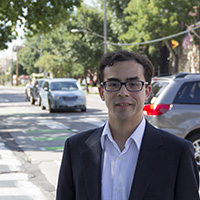Michael Levin - Dynamic network loading model of autonomous vehicle behaviors
Guest speaker Michael Levin presented a seminar at rCITI on Thursday 23 June 2016.

Michael W. Levin is a doctoral candidate in transportation engineering at The University of Texas at Austin. He received a B.S. degree in computer science and a M.S. degree in civil engineering from The University of Texas at Austin in 2013 and 2015, respectively. He is a recipient of the Dwight D. Eisenhower Fellowship from the Federal Highway Administration and the 2016 Milton Pikarsky Award from the Council of University Transportation Centers. His research focuses on network modeling of autonomous vehicles.
Michael's presentation was on dynamic network loading model of autonomous vehicle behaviors. Autonomous vehicles have the potential to improve link and intersection traffic behavior. Computer reaction times may admit reduced following headways and increase capacity and backwards wave speed. The degree of these improvements will depend on the proportion of autonomous vehicles in the network. To model arbitrary shared road scenarios, we develop a multiclass cell transmission model that admits variations in capacity and backwards wave speed in response to class proportions within each cell. It was shown the development of a car following model which incorporated the driver reaction time to predict capacity and backwards wave speed for multiclass scenarios. He also presented a study reservation-based intersection control, which uses autonomous vehicle communications and precision to increase intersection utilization. Although reservations have been studied in several microsimulation models, they have yet to be analyzed under user equilibrium behavior due to tractability. The study proposed mesoscopic node model of reservations compatible with general mesoscopic link flow models. It showed results on freeway, arterial, and city networks showed that although increased link capacities reduce congestion in all tested scenarios, reservations can have a positive or negative impact on congestion depending on the network topology. However, further study on optimizing reservations is still needed.




